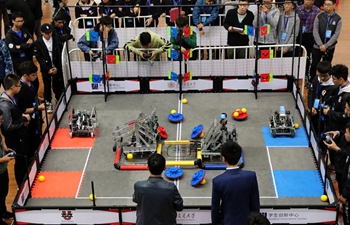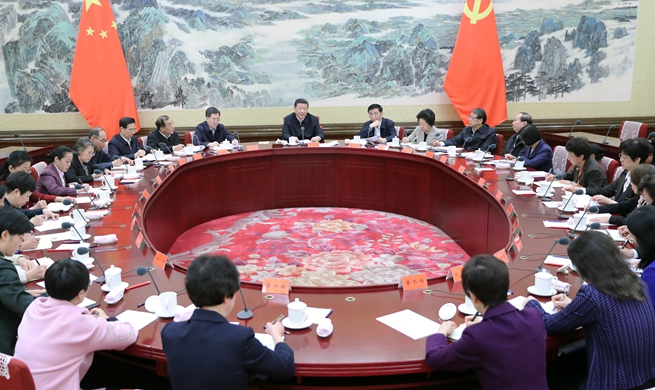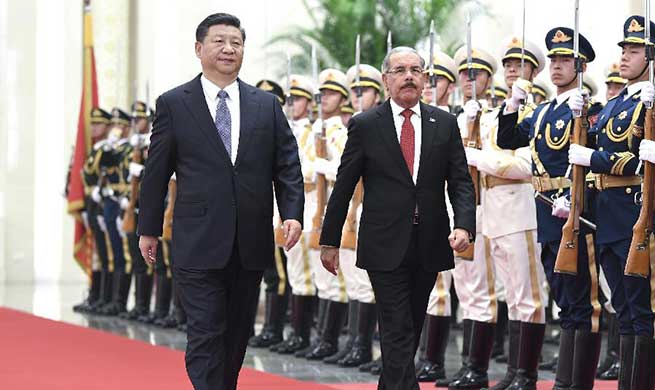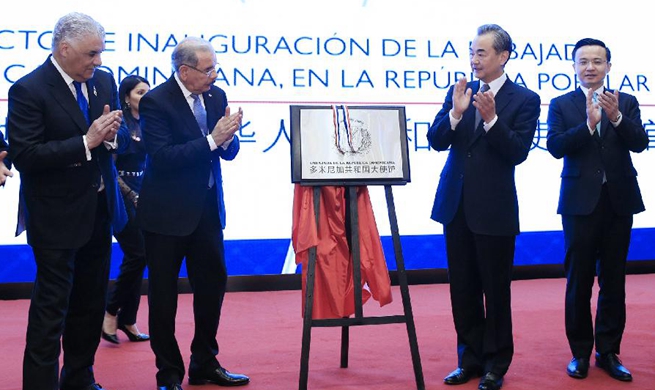BEIJING, Nov. 3 (Xinhua) -- For many years, pieces of debris from building projects in China have been randomly disposed of. But now, many of them are being reborn.
In Shahe Town of Beijing's Changping District, several trucks of construction waste are sent into waste recycling facilities and turned into new building materials for a new park nearby.
The waste was generated by the demolition and renovation work of the town. According to local official Song Yan, increasing demolition and renovation work has generated a large volume of construction waste, which is expected to reach 2.3 million tonnes by 2020.
"If all the construction waste is disposed of using traditional landfill methods, it will occupy 15 hectares of land with a depth of 10 meters, equivalent to 22 football fields," Song said.
Thanks to the on-site construction waste recycling facility introduced by the town, the waste is being crushed, filtered and processed to become recycled aggregate, which can be used as raw materials to produce bricks, mortar and concrete.
"About 95 percent of the building debris can be recycled. It will be used to pave the road for the park," Song said.
The rebirth of construction waste in Shahe Town reflects China's new move of disposing construction waste in a more resource-saving and environment-friendly way.
Accelerating urbanization and booming construction have led to an increasing volume of construction waste in China.
The amount of construction waste generated in China is as high as 1.8 billion tonnes per year. However, most of it is randomly dumped and the recycling rate is less than five percent, according to Chen Jialong, an expert in construction waste management at the China Association of Environmental Protection Industry.
Improper handling of construction waste also causes soil and underground water pollution, and poses a security and health threat to the public, Chen said.
Many places in China have rolled out new regulations and toughened rules related to the disposal of construction waste, hoping to make sure the waste is properly handled and reused. At the same time, they also set up new disposal facilities and increased the capability of processing the growing volume of construction waste.
In April, the Ministry of Housing and Urban-Rural Development issued a plan to carry out pilot work on construction waste management in 35 cities.
Xi'an in northwest China's Shaanxi Province has set up a monitoring platform for the transportation and processing of construction waste. It plans to set up six new recycling centers for construction waste and offer financial subsidies for related companies.
Many of those companies are also doing their bit in the recycling of construction waste.
Jiangsu LVHE Environmental Technology Company has been developing and innovating technology and equipment to recycle construction waste since it was established in 2014.
Yang Yingjian, general manager of the company, said they have borrowed recycling technology from many countries including Finland, the Netherlands, Britain and Japan.
"Our new waste disposal facility put into use in Jiangsu Province in May adopts the world's leading artificial intelligence sorting technology. It can identify the type of construction waste through composite sensors, and sort out 13 to 15 categories according to the nature and size of the materials, so that it can be used in a targeted manner," Yang said.
Yang admits that it is still hard to make profits from recycling construction waste and they have to partly rely on government subsidies as the cost of recycling is high.
"Under the tough regulations, more companies that produce construction waste also increase their environmental awareness. They become more responsible and are willing to pay for the cost of recycling instead of just randomly dumping it, which will lead to more business opportunities for us," Yang said.
The company's recycled products including cement and bricks have passed quality tests and have been exported to countries including Pakistan and Kenya.
"As the prices of raw building materials rise, our recycled products become more competitive. We are really turning trash into cash," Yang said.

















